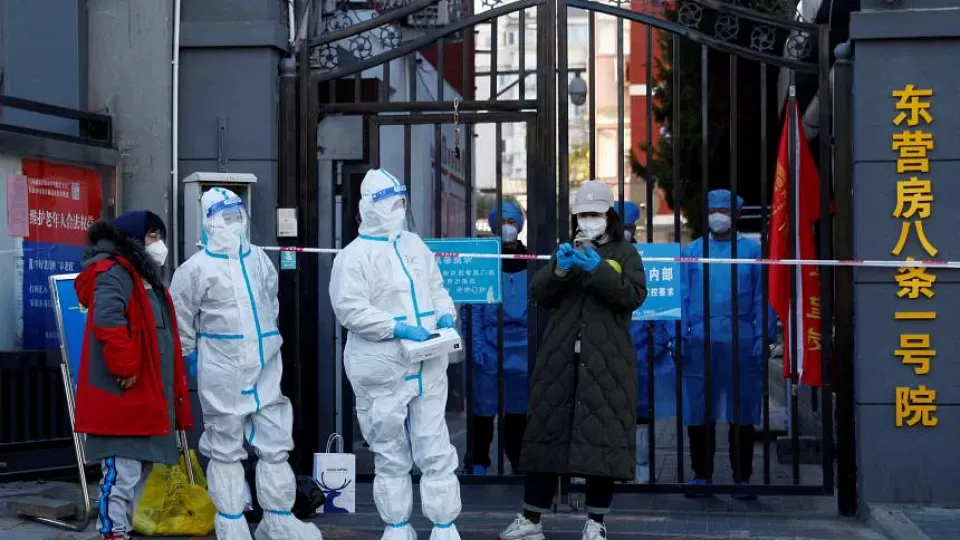October 28, 2022
BEIJING – Hopes that China would ease up on its onerous zero-Covid-19 policy after the Communist Party of China’s (CPC) 20th congress ended last week have been dashed, as the country appears to be doubling down on the strategy.
China on Thursday reported 1,264 new cases, many concentrated in the north-west of the country, including in Qinghai, Xinjiang and Inner Mongolia.
Across China, 28 cities have implemented varying degrees of lockdown measures, according to Nomura, affecting about 207.7 million people. Being in the wrong place at the wrong time could mean crossing paths with a positive case, resulting in quarantine.
Accusations shared online of local merchants’ price gouging on essential items have been swiftly deleted by censors.
Even as the government tries to facilitate the entry of foreign business people, the tightening of curbs domestically continues to frustrate a wearied populace.
But the local authorities could be taking a cue from President Xi Jinping, who said during last week’s congress that the Communist Party puts people and lives above all else by “tenaciously” pursuing a zero-Covid-19 policy.
“In launching an all-out people’s war to stop the spread of the virus, we have protected the people’s health and safety to the greatest extent possible and made tremendously encouraging achievements in both epidemic response and economic and social developments,” he said.
Since the “Golden Week” National Day holidays in early October, Beijing has barred entry to travellers from areas with Covid-19 cases – ostensibly to prevent an outbreak in the capital city during the most important political event of the year.
But with new cases surfacing almost daily, the capital has not rolled back on its strict travel curbs as quickly as expected.
Defying State Council rules, Beijing on Tuesday mandated that all entering the capital cannot have travelled to places with Covid-19 cases in the past 14 days – double the nationwide requirement – stranding hundreds of the city’s residents who had travelled during the holiday season.
Beijing’s Universal Studios theme park and its attached hotel, several malls across the capital and the high-end Four Seasons Hotel in the city centre have been shut because positive cases had passed through.
Financial hub Shanghai is planning to build a permanent quarantine centre on an inner-city river island, according to business magazine Caixin, which cited tender documents. The 3,250-bed facility is expected to cost about 1.6 million yuan (S$311,500) and would be completed in six months.
The city had earlier in October stepped up the hiring of workers to test and trace people for Covid-19 after a spike in cases following the holidays.

People queueing to be swabbed for Covid-19 in Shanghai on Oct 18. PHOTO: EPA-EFE
Economic powerhouse Guangzhou, the capital of Guangdong province, locked down more streets and neighbourhoods as a Covid-19 outbreak dragged into its fourth week.
Wuhan, site of the world’s first Covid-19 outbreak in late 2019, reported about 20 to 25 new infections a day this week. Local authorities have ordered more than 800,000 people in one district to stay at home until Oct 30.
“I don’t know what to do. If we can still survive living like this, then I suppose that’s what we’ll do,” a Wuhan resident surnamed Chang, 38, told Reuters.
“When we see these news stories about Covid-19, we now feel a bit numb. We feel numb to it all. We feel more and more numb.”
The city has also stopped the sale of pork in some areas after the authorities said one case was linked to the pork supply chain.
In Xining, Qinghai’s capital city of 2.5 million people, netizens reported food shortages and price increases for essential goods as the health authorities raced to contain a Covid-19 rebound following the National Day holidays.
“To reduce the risk of transmission, some vegetable and fruit stores have been closed and put under quarantine,” said a Xining government official on Wednesday.
Other large cities in China, including Zhengzhou, Datong and Xi’an, implemented new curbs this week to rein in local outbreaks.
The country’s strict policies on Covid-19 have also taken a toll on consumer sentiment. Economic data released on Monday showed unexpected growth in last quarter’s gross domestic product, but domestic consumption remains soft.


